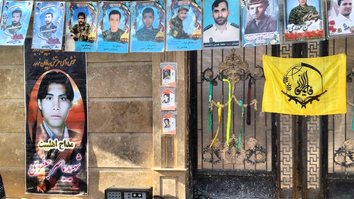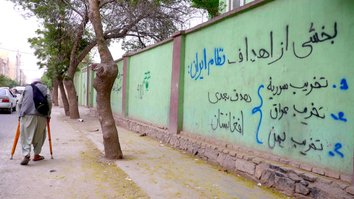KABUL -- The Taliban's oppression of and discrimination against Shia Hazaras and other minority ethnic groups in Afghanistan risk providing a justification for the Iran-backed Fatemiyoun Division and other groups to bring their "jihad" to Afghanistan.
The Fatemiyoun Division is a militia made up of Afghans funded, trained and equipped by Iran's Islamic Revolutionary Guard Corps (IRGC), and has fought in Syria on behalf of the Syrian regime since 2014.
To recruit fighters, Iran has long been known to exploit Afghan migrants, either by appealing to Shias' sense of religious obligation or with promises of money and Iranian residence permits.
Last year, for instance, Tehran promised to distribute residential plots to the families of those who have been killed while serving in the Fatemiyoun Division in Syria -- a move seen by many as a bid by the Iranian regime to deceive Afghans residing in Iran under deplorable conditions into joining the militia.
![Members of the Hazara community offer Friday prayer outside a mosque on the outskirts of Kabul on September 10. [Aamir Qureshi/AFP]](/cnmi_st/images/2021/09/27/31872-000_9ml3t7__1_-585_329.jpg)
Members of the Hazara community offer Friday prayer outside a mosque on the outskirts of Kabul on September 10. [Aamir Qureshi/AFP]
![Members of the Fatemiyoun Division gather in Mashhad, Iran, in 2019 to commemorate the martyrdom of Imam Reza. [File]](/cnmi_st/images/2021/09/27/31876-fatemiyoun__3_-585_329.jpg)
Members of the Fatemiyoun Division gather in Mashhad, Iran, in 2019 to commemorate the martyrdom of Imam Reza. [File]
After fighting in Iran's proxy wars, however, the militia members and the families of those killed are often left with nothing, and some are questioning their reasons for going to Syria.
At its height, there were an estimated 10,000–20,000 Afghans fighting in the militia.
"Two groups of Afghans have fought in Syria against the 'Islamic State of Iraq and Syria' (ISIS), Jabhat al-Nusra and other anti-Bashar al-Assad groups," said Ali, 47-year-old Fatemiyoun commander who fought for two and a half years in Syria and now lives in Kabul.
"The first group consists of those who fought to defend their holy sites: shrines of Zainab and Ruqia, the sister and daughter of Imam Hussain, the third imam of Shia Muslims," he said. "Hundreds of them are still present in Syria."
"The second group of fighters comprised immigrants living in Iran and a number of young men recruited inside Afghanistan," he said.
"They fought for money and other promises made to them by the Iranians, such as granting them permanent residence in Iran."
Hazaras persecuted
Members of the Fatemiyoun driven by religious fervour are now contemplating returning to Afghanistan amid increasing reports of the Taliban's discrimination against the Shia minority.
Residents of a Hazara-dominated farming community in central Afghanistan said they had been ordered out of their homes by Taliban fighters doing the bidding of Pashtun landlords who wanted to seize their crops and stores, AFP reported Friday (September 24).
The Taliban ordered more than 800 families out of their homes in a remote district straddling the provinces of Daikundi and Uruzgan, Mohammad Mohaqiq, a Hazara political leader exiled since the Taliban takeover, said last month about that situation in a letter published on social media last week.
The militants last month also decapitated a statue of Abdul Ali Mazari, a prominent anti-Taliban fighter and a political leader who represented the Hazara community, in Bamiyan city. The Taliban killed him in 1996.
The Hazaras are a mostly Shia ethnic minority that has long been persecuted by the Taliban and ISIS, who consider them heretics.
Thousands of Hazaras have been trained by Iranian security forces and deployed with Shia militias in Syria's civil war over the past decade, including the Fatemiyoun Division.
"The targeted killing of Hazaras, the destruction of the statue of their leader in Bamiyan and disregard of Hazaras in the Taliban's government will make members of the Fatemiyoun Division return to their country," Ali said.
"Based on my knowledge of them," he said, "it is likely that they will take up arms against the Taliban."
Returning to Afghanistan
Abbas, a Fatemiyoun fighter who now lives in Iran, said he was willing to return to defend Afghanistan.
"If our faith and our people are in danger in Afghanistan or anywhere else, we will go ... and fight as we did in Syria to defend our faith and our people," he said.
"We are not in favour of war in our country," he said. "Our people need peace and social justice, but the destruction of the statue of the martyr Mazari, the only Hazara leader in Bamiyan, and the oppression of and discrimination against Hazaras by the Taliban will force us to fight as we did in Syria to defend our faith and people."
"Iranians have invested heavily in the Kandahar-based Taliban," said Tamim Nuristani, former governor of Nuristan province.
"Now that the Haqqani Network have gained more power in the Taliban government and marginalised the Iranian-backed group, the likelihood of opening a new front against the Taliban has increased," he said.
"If Iran's relationship with the Taliban deteriorates and the IRGC does not co-operate with the Taliban, the Fatemiyoun will become active in Afghanistan," Nuristani predicted.
"Denying Hazaras rights under the Taliban regime and humiliating and targeting Hazaras will make the IRGC activate the Fatemiyoun in Afghanistan," he said, adding that it is "very likely" the Fatemiyoun Division will take up arms against the Taliban in Afghanistan.
Ethnic, religious war in Afghanistan
"By using force and discrimination and adopting a policy of elimination, the Taliban are trying to root out the Shia [sect] and other ethnic groups from the government and the political power," said Assadullah Ibrahimi, a 31-year-old student studying political science at a private university in Kabul.
"The Taliban's efforts to eliminate others, especially the Hazaras, will lead to the creation of militant groups soon," he said. "The Fatemiyoun will take action to defend the rights of Shias, while other ethnic groups will form new fronts as well."
"In this case, we will witness the bloodiest religious and ethnic conflict," he said.
"According to some reports, two or three years ago, when the Taliban oppressed Hazaras in some districts of Ghazni and Uruzgan, the Fatemiyoun clashed with the Taliban in those areas," Ibrahimi said.
"Today again, if the Taliban do not respect the demands of religious and ethnic groups and do not form an inclusive government in which Hazaras, Tajiks, Uzbeks and other groups are included, it will open an opportunity for [Afghanistan's] neighbours," he said.
"The Fatemiyoun will come from Syria to Afghanistan, and other ethnic groups will take up arms," said Salim Paigir, a political analyst.
This could "start an ethnic and religious war in Afghanistan and turn it into Syria," he said.

![Fatemiyoun fighters are shown in an undisclosed location in a photo posted in July. [Fatemiyoun]](/cnmi_st/images/2021/09/27/31875-fatemiyoun-585_329.jpg)







I think its much helpful
Reply1 Comment